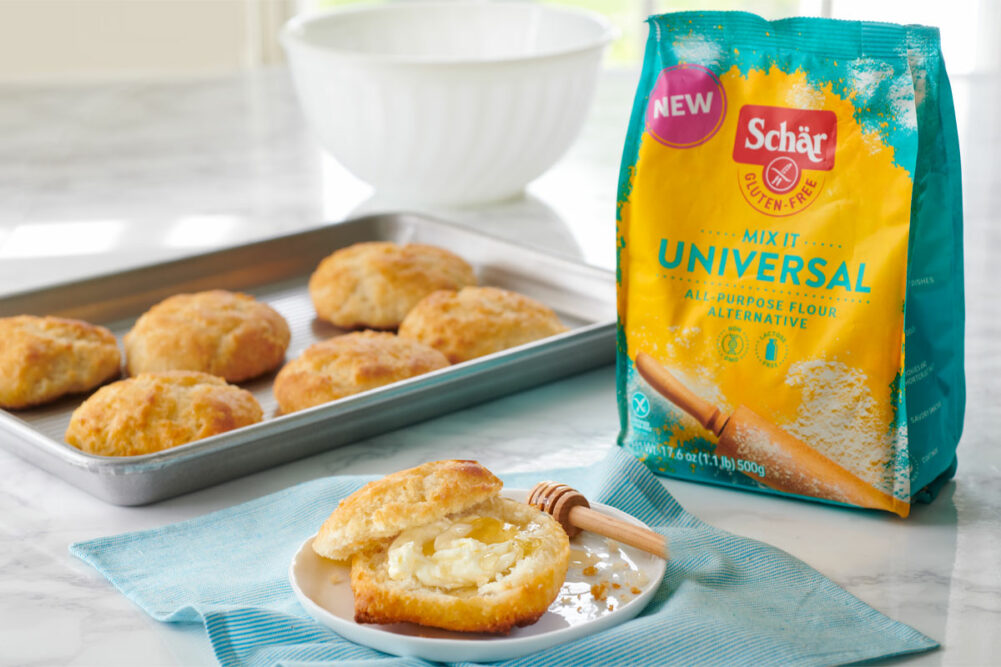SWEDESBORO, NJ — Dr. Schar USA Inc., a business unit of Dr. Schar AG, Burgstall, Italy, is expanding its US manufacturing capacity and its portfolio into new categories. The strategy behind the investments is to diversify and grow the company’s share of the North American market for gluten-free baked foods.
In November, Dr. Schar USA opened an addition to its manufacturing plant in Logan Township, NJ. The $18 million investment has doubled production capacity, according to the company. In an interview with Food Business News, Hannes Berger, chief executive officer and president of Dr. Schar USA, said the company plans to add a line and triple capacity in the next two years.
“Our proximity to the customer is now even closer, allowing us to provide the freshest product to them,” Mr. Berger said of the more recent addition. “This is a purpose driven company, and we need to be as close to the consumer as we can.”
The company’s investments come at a time when interest in gluten-free baked foods beyond consumers with celiac disease and gluten intolerance has lessened.
 Hannes Berger, president and CEO, Dr. Schar USA Inc. Photo: Dr. Schar USA Inc.
Hannes Berger, president and CEO, Dr. Schar USA Inc. Photo: Dr. Schar USA Inc.“Between 2010 and 2020 there was an increasing awareness about gluten-free,” Mr. Berger said. “The national press, Hollywood celebrities and many companies were promoting a gluten-free lifestyle (and) leading to a quick expansion of gluten-free products across America.
“In 2022, however — after two years of COVID that led to supply shortages and another spike of demand — the market is not growing anymore. One of the main reasons is that many consumers moved on to new ‘healthy and environmentally sustainable lifestyles’ like vegan, vegetarian or keto nutrition. So, what is happening to the gluten-free market right now? It is coming back to its original and most important mission: (serving) all consumers who are suffering from celiac disease and gluten-intolerances.”
Mr. Berger added that the group is Dr. Schar’s core consumer and central to the company’s mission.
“Our core consumer are people suffering from celiac disease, gluten intolerance and IBS, irritable bowel syndrome,” he said. “But the common denominator is they are suffering. They have something they want to change; something in their life that is causing them to suffer.”
The sales of gluten-free products make up more than 90% of Dr. Schar’s global sales. In North America, gluten-free baked foods make up 100% of sales.
“Our company has a strong position in gluten-free bread and rolls,” Mr. Berger said. “That’s where we are one of the two leading (gluten-free) companies in the US.
“In that space volume has stalled and become what I'd call a classic retail business. But there are still opportunities to explore.”
Two areas of potential growth are foodservice and snacks.
“In foodservice, I think there is a lot of growth for us,” Mr. Berger said. Channels where he sees opportunities include fast-food, hotels and education.
Snack applications the company specializes in include biscuits and crackers.
“Our market share is much smaller there and we are importing all of our products from sister companies in Europe,” Mr. Berger said. “We will start co-manufacturing in the US next year and would love to expand even more of our portfolio with other reliable partners who can meet our highest quality standards.”
He said self-manufacturing is an option but will depend on the size of the gluten-free snacks business in North America in three to five years.
An early headwind to success in gluten-free baked foods manufacturing was product quality, which improved over time as manufacturers, equipment suppliers and ingredient suppliers developed process, baking and formulation solutions.
“A focus for us is on product innovation and process innovation,” Mr. Berger said. “We want to deliver the highest quality standard; we want customers to have the same pleasurable experience as before they went on the diet.”
He noted that success in gluten-free manufacturing comes down to equipment and ingredient technologies.
“Our recipes tend to be very complex,” he said. “We are replacing the glue in the dough, and it is still elastic.”
Due to intellectual property constraints, Mr. Berger would not go into details, but did say the company uses a variety of grains, including amaranth, millet and buckwheat in its formulations.
Dr. Schar USA saw its sales rise during the first few years of the COVID-19 pandemic. The period also pushed the company to better understand the role ecommerce can play at retail.
“Before the pandemic it was not as easy for everybody in some states to buy our products if they didn’t have a Walmart nearby,” Mr. Berger said. “Now they can buy our products online.”
A new headwind for the company, and almost all food and beverage manufacturers, has been the supply chain. Mr. Berger said a challenge the company has faced has been ingredient availability.
“It's a fight for resources and ingredients in South America or India; to get a product on a container,” he said. “There are a lot of hurdles to overcome. Availability is an issue and it's not just new product development, but for existing products, too.”





